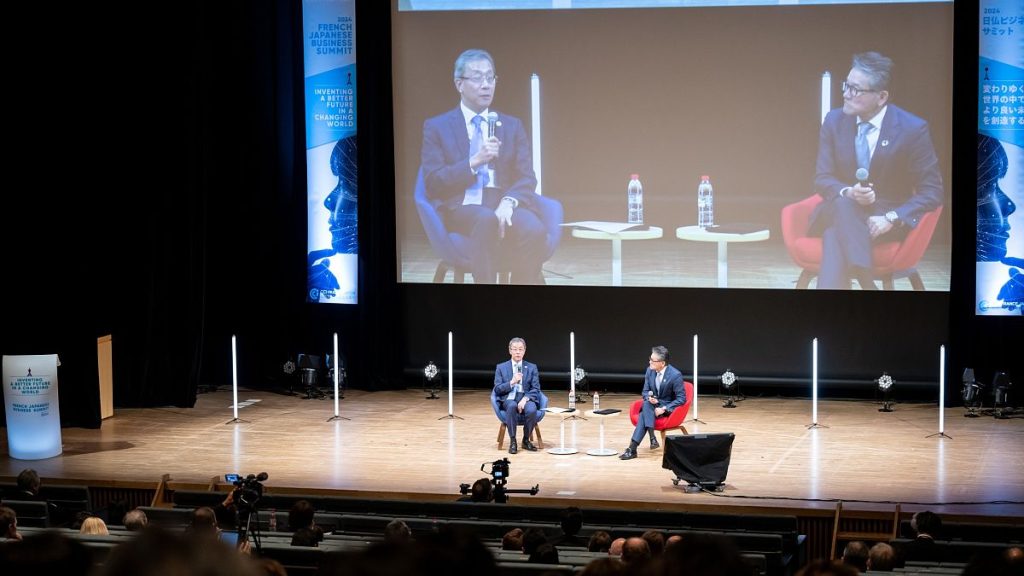The French Japanese Business Summit in Tokyo served as a crucial platform for CEOs, academics, and policymakers to strategize for a resilient and innovative future amidst escalating global volatility. With the backdrop of a potential second Donald Trump presidency, the ongoing war in Ukraine, and renewed tensions in the Middle East, the summit, organized by the French Chamber of Commerce and Industry in Japan (CCI France Japan), addressed the multitude of challenges facing businesses in today’s dynamic landscape. From competitive pressures and protectionist policies to supply chain disruptions and recruitment hurdles, the overarching message was clear: adaptation and innovation are paramount for survival. The summit aimed to foster dialogue and collaboration, enabling participants to develop strategies for navigating these uncertainties and strengthening Franco-Japanese business partnerships.
A recurring theme throughout the summit was the pervasive uncertainty permeating the global business environment. Mitsubishi Electric, a prominent participant, highlighted the significant challenges posed by supply chain disruptions stemming from geopolitical instability and the potential resurgence of trade tariffs under a second Trump administration. The company emphasized the need for scenario planning and adaptability to mitigate these risks. This sentiment echoed across the summit, underscoring the importance of proactive strategies to address unpredictable geopolitical and economic shifts.
The summit showcased not only established industry giants but also innovative startups like Power X Inc., a Japanese company focused on developing battery technology for renewable energy storage. Power X Inc.’s CEO, Masahiro Ito, acknowledged the global nature of supply chains and the challenges posed by the increasing trend of decoupling, where countries reduce their reliance on international trade and investment. However, Ito also pointed out that this decoupling presents opportunities, particularly for domestic businesses catering to clients who prioritize locally controlled and sourced products. This duality of challenge and opportunity within the decoupling trend underscores the complex and multifaceted nature of the current global economic landscape.
Sustainability emerged as a central focus of the summit, with discussions revolving around the green transition, decarbonization, and the development of sustainable economies. This emphasis reflects the growing pressure on businesses to demonstrate their environmental responsibility, driven by both regulatory requirements and increasing consumer awareness. The urgency of climate action was underscored by references to the dire warnings issued at COP29, highlighting the need for rapid and fundamental change. Power X Inc.’s Ito emphasized the importance of making cleaner energy sources economically viable to drive widespread adoption, suggesting that technological advancements are making this a realistic possibility.
Food security and global health were also key considerations, particularly in light of the threats posed by climate change. Ajinomoto, a Japanese multinational food company, outlined its dual commitment to improving global health and reducing its environmental footprint. The company highlighted its initiatives to reduce salt consumption and promote sustainable practices, including reducing food and plastic waste and conserving biodiversity. A key example is their partnership with Danone to implement an animal feed product that reduces greenhouse gas emissions from dairy farming, showcasing a collaborative approach to tackling sustainability challenges.
Consumer behavior and expectations played a significant role in shaping the summit’s discourse. Ajinomoto stressed the dramatic shift in consumer preferences, particularly among younger generations, who prioritize sustainability. This highlights the growing importance of incorporating sustainability into business strategies, not just as a matter of corporate responsibility but as a crucial factor for future success. This consumer-driven shift towards sustainability reinforces the message that businesses must adapt to evolving demands or risk being left behind. The summit served as a valuable forum for exploring the interconnected challenges and opportunities facing businesses in a world grappling with geopolitical uncertainty, climate change, and shifting consumer priorities.














